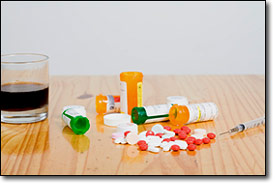
No other disorder cuts across so many domains and is connected with other disorders as substance abuse. An estimated 2.3 million Americans annually seek treatment for substance abuse. Yet despite its widespread occurrence, clients who come to therapy usually don’t come for that issue. Most people with substance abuse problems attempt to treat themselves. If they come to therapy, they are likely to present and talk about other issues. Therefore, it is imperative for the therapist to be able to identify the signs of substance abuse–both the obvious and subtle ones. Further challenging to therapists: the newer substances such as synthetic cannabinoids, the rapidly proliferating knowledge about how various substances affect the brain, and the latest ideas about treatment.
DID YOU KNOW?
- The most recent survey from the Substance Abuse and Mental health Services Administration finds that use of pain relievers for non-medical use increased in one year from 199,000 to 438,000 users.
- Today’s indoor cultivated cannabis is two to three times more potent than field grown cannabis.
- Much synthetic cannabis–far more harmful than cannabis– is disguised as real marijuana by spraying synthetic cannabis over vegetable matter.
- Ecstasy, often known as MDMA, can also be any one of several different substances.
- Among all income groups, people who earn over $75,000 annually comprise the highest percentage of binge drinkers.
- Binge drinking causes over 80,000 deaths annually in the United States.
- Short-term, or one-time (one session) treatment for substance abuse is seldom effective.
- Unlike many claims to the contrary, there is no one most effective treatment; treatments must be tailored to the individual struggles, personality, context of living and not just to the substance or the addiction.
- There are many therapeutic approaches and theoretical orientations that can successfully guide and inform psychotherapists in their work with substance abuse and addicted clients.
- While some clients may benefit from 12-Step Programs, others may benefit from a harm reduction or ‘controlled use’ approach (which is much more popular in Europe than in the US), yet others respond well to a family-education type approach or mindfulness-based approaches.
- The most effective treatment plans are flexible during the course of treatment and must take into account each individual’s gender, social and cultural considerations.
- Effective interventions can involve not just the addicted person recognizing and taking responsibility for his or her substance use, but the family recognizing and taking responsibility for their parts in contributing to the abuse.
- There are increased number of Apps (Google “Apps Drug Addiction”) and online tools that can help addicted clients and their therapists.